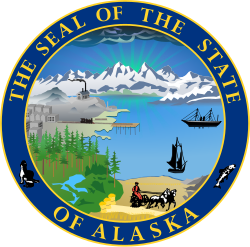| |||||||||||||||||
| |||||||||||||||||
 Results by state house district Murkowski: 50–60% 60–70% Gruening: 50–60% 60–70% 70–80% | |||||||||||||||||
| |||||||||||||||||
| Elections in Alaska |
|---|
 |
The 1980 United States Senate election in Alaska was held on November 4, 1980. Incumbent Democratic United States Senator Mike Gravel ran for a third term in the United States Senate, but lost in the Democratic primary to Clark Gruening, a former state representative who was the grandson of Ernest Gruening, whom Gravel had defeated twelve years prior in an election for the same seat. Gruening later went on to lose the general election to Republican nominee Frank Murkowski, a banker. With Murkowski's victory, this marked the first time in history that Republicans held both of Alaska's Senate seats or that the state had an entirely Republican congressional delegation.
Contents
- Democratic primary
- Candidates
- Campaign
- Results
- Republican primary
- Candidates 2
- Results 2
- General election
- Results 3
- See also
- References
After the loss of Gravel's seat, no Alaska Democrat would win a congressional race again until Mark Begich's narrow victory in Alaska's 2008 Senate election. [1]

